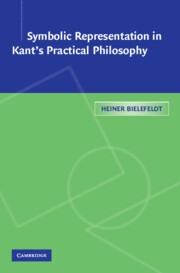Book contents
- Frontmatter
- Contents
- Citations and Translations
- Acknowledgments
- I INTRODUCTION
- II KANT'S SOCRATIC ENLIGHTENMENT
- III THE LAW OF FREEDOM
- IV HOW TO FIND ORIENTATION IN MORAL PRACTICE
- V THE ORDER OF RIGHTS AS A SYMBOL OF HUMAN DIGNITY
- VI TRACES OF PURPOSIVENESS IN NATURE AND HISTORY
- VII SYMBOLISM IN THE PHILOSOPHY OF RELIGION
- VIII CONCLUSION
- Bibliography
- Index
III - THE LAW OF FREEDOM
Published online by Cambridge University Press: 12 July 2009
- Frontmatter
- Contents
- Citations and Translations
- Acknowledgments
- I INTRODUCTION
- II KANT'S SOCRATIC ENLIGHTENMENT
- III THE LAW OF FREEDOM
- IV HOW TO FIND ORIENTATION IN MORAL PRACTICE
- V THE ORDER OF RIGHTS AS A SYMBOL OF HUMAN DIGNITY
- VI TRACES OF PURPOSIVENESS IN NATURE AND HISTORY
- VII SYMBOLISM IN THE PHILOSOPHY OF RELIGION
- VIII CONCLUSION
- Bibliography
- Index
Summary
In the last chapter, we saw that according to Kant, the morally unconditioned is “incomprehensible” in that it cannot become a direct object of human cognition. It is obvious, however, that in order to exert an effect on human behavior, the unconditioned must in some way connect with our cognitive faculties as well as with our empirical inclinations. The question of how this double connection comes about is the topic of this chapter. Although in moral practice the cognitive and the motivational (that is, emotional) aspects of morality are inextricably linked, these two aspects require separate analyses. Whereas Sections 2 and 3 deal with Kant's various formulations of the categorical imperative (thus addressing the cognitive side of human morality), Section 4 analyzes the peculiar emotions that the moral law triggers by commanding an unconditional respect. Section 5 sums up the consequences of this investigation for an understanding of Kant's symbolism. At the beginning of the present chapter, however, I would like to introduce Kant's concept of the “fact of reason,” which, at least implicitly, comprises simultaneously both the cognitive and the motivational components within our “experience” of the morally unconditioned.
The “Fact of Reason”
The doctrine of the “fact of reason,” which Kant presents in his Critique of Practical Reason, is a peculiar doctrine. It follows from the insight that any attempt to deduce the supreme principle of morality by means of theoretical speculation (let alone empirical demonstration) is bound to fail.
- Type
- Chapter
- Information
- Symbolic Representation in Kant's Practical Philosophy , pp. 40 - 67Publisher: Cambridge University PressPrint publication year: 2003



